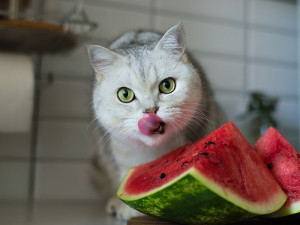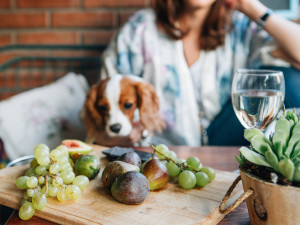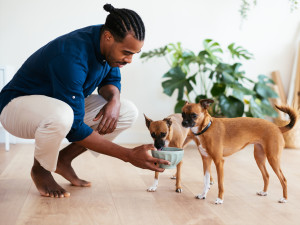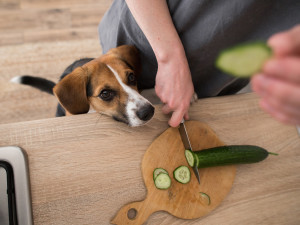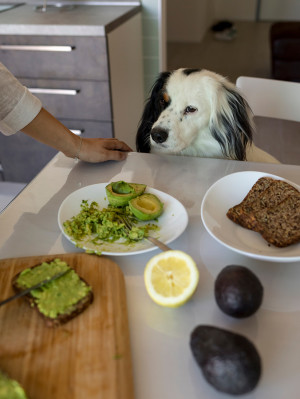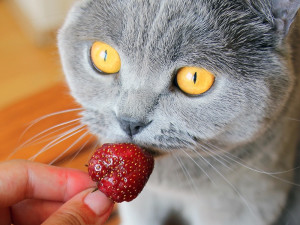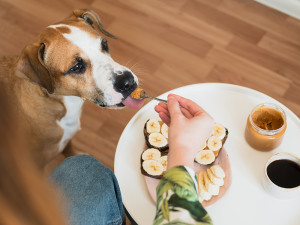Can Your Dog Eat Watermelon?
Yep, you can share watermelon with your pup — but there are a few safety tips to keep in mind.
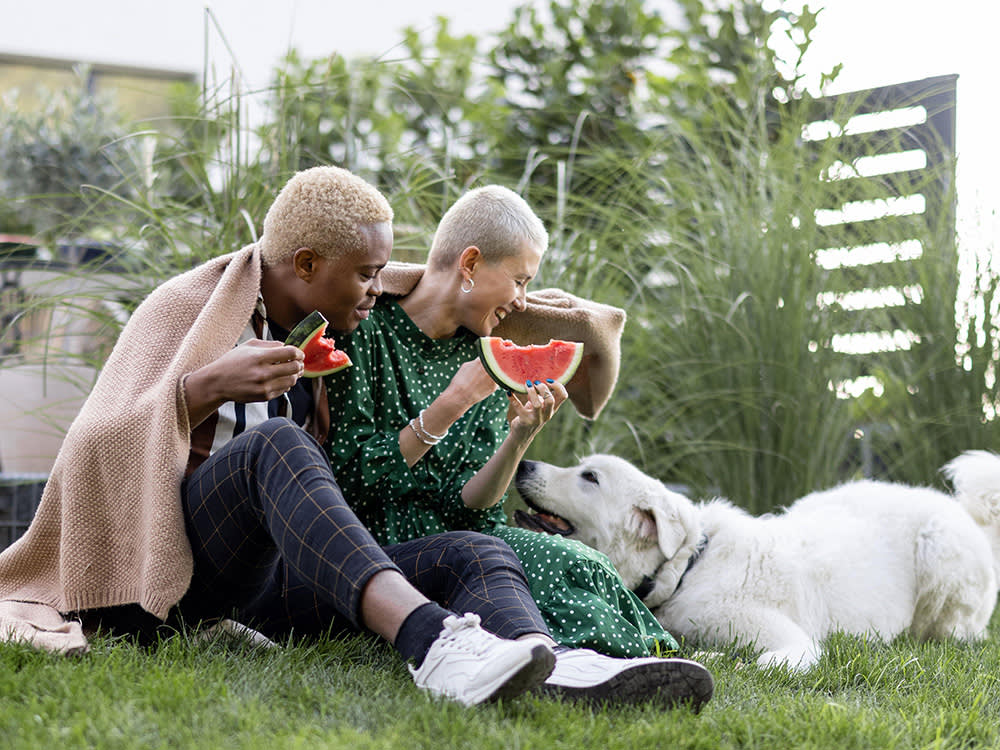
Share Article
Most people can agree that a juicy slice of watermelon makes a refreshing snack, especially as this summer, with its record-high tempsopens in a new tab, continues to hang on. What if your dog wants to be one the cool kids and snack on watermelon, too? Can you share? Yes, but in moderation and with proper preparation.
Nutrition Facts: Watermelon for Dogs
Watermelons are more than 90 percent water, making them a great way to help stay hydrated. They are low in calories and high in vitamins and antioxidants. Watermelon is one of the best natural sources of lycopene, which is considered a powerful antioxidant. Watermelon is also a good source of Vitamins A, B, and C. Potassium and magnesium, two essential minerals, are also present in high quantities.

littleKin™ is Kinship’s home just for puppy and kitten parents. Bop over to check out expert advice, new pet tools, and special deals—all curated for your newest family member.
opens in a new tabIs watermelon good for dogs?
While properly prepared watermelon isn’t toxic to dogs, it has not been proven to be beneficial to them either. Watermelon’s low calorie count and high water content make it a better treat option than other fruits, but that doesn’t mean that it’s great for all dogs. This sweet fruit is full of natural sugars. Dogs who are overweightopens in a new tab or diabeticopens in a new tab should not be fed watermelon or other sugary treats. Dogs with sensitive gastrointestinal tracts may not tolerate watermelon very well either. Even if your dog craves delicious watermelon pieces, the amount should be kept in moderation.
Can dogs eat watermelon seeds or rinds?
Dogs should not eat watermelon seeds or rinds, so feeding watermelon to your dog takes a little bit of preparation. Before offering watermelon to your dog, be sure to remove all of the seeds. Seeds can be a choking hazard in small dogs and can also cause some stomach upset. Watermelon seeds also contain cyanide. While it’s highly unlikely that any dog would ingest enough seeds to cause toxicity, it’s best to remove the seeds first.
Dogs should not eat watermelon rinds, either. The rinds are tough to chew and do not digest completely, putting dogs at risk for developing intestinal obstruction if swallowed. When preparing watermelon for your dog, remove the seeds and the rind before offering small amounts of the flesh.
Is watermelon completely safe for dogs?
Most dogs can be fed small pieces of watermelon flesh without any issues. Dogs who are sensitive to diet changes or dogs who need to have restricted sugar intake should not be given watermelon. Consult your veterinarian first if you have any questions or concerns with any new food or treat.
The bottom line: Can dogs eat human food?
There are many human foods that dogs can eat safely. Best practice is to consult your veterinarian before offering human foods to ensure that they are non-toxic and safe for your dog. At the very least, perform a thorough internet search using reputable sites like this one or the ASPCA Animal Poison Control websiteopens in a new tab.
Human food and other treats should not make up more than 10 percent of your dog’s diet, so moderation is key. Overloading your dog on snacks can lead to obesity, diabetes, or imbalanced nutrition. If your dog does not tolerate treats or diet changes well, just skip them.
Other Fruits That Are Good/Safe For Dogs
Blueberriesopens in a new tab: Blueberries and watermelon have a lot in common. They are both low in calories, high in antioxidants, and freezing them can make fun, crunchy, dog-safe treats.
Applesopens in a new tab: Dogs who favor crunchy snacks can enjoy fiber-rich apples. Like watermelon, they require a little preparation — be sure to remove the seeds and the core. Avoid feeding large chunks to dogs who are likely to swallow their apple snacks whole.
Bananasopens in a new tab: Bananas are also a safe treat for dogs. These tend to be on the sugary side (especially the really ripe ones), so feed them in moderation. And don’t give dogs banana peels.
Other Fruits That Are Dangerous
Grapesopens in a new tab: Grapes and raisins are toxic to dogs. They contain a toxin called tartaric acid and can cause kidney failure in some dogs.
Cherries: Dogs should not be fed cherries. Cherry pits, stems, and leaves all contain cyanide. The pits are also a choking hazard and can cause intestinal obstruction in smaller dogs. While the flesh of cherries are not toxic to dogs, they contain high levels of sugar that tend to cause gastrointestinal upset.
Avocadoopens in a new tab: Dogs should not eat avocados. Avocado pits, leaves, and stems all contain persin, a toxin that can cause severe vomitingopens in a new tab and diarrheaopens in a new tab. Avocado pits can also cause intestinal obstruction. Avocado pulp is not toxic to dogs, but it is very fatty, potentially causing gastrointestinal upset or pancreatitis.
FAQs (People Also Ask):
Can dogs eat watermelon?
Dogs can eat watermelon as long as the seeds and rind are removed first.
How much watermelon can a dog eat?
Watermelon is full of natural sugars and should be fed in moderation. Treats (even fruit) should not make up more than 10 percent of your dog’s diet.
Is watermelon healthy for dogs?
Although properly prepared (seeds and rind removed) watermelon isn’t toxic to dogs, it has not been proven to be beneficial to them either.
Can dogs eat watermelon rinds?
Dogs should not eat watermelon rinds because they are a choking hazard and can cause intestinal obstruction.
Is watermelon safe for dogs?
Watermelon flesh is safe for dogs to eat. Watermelon seeds and rind should be removed before offering the fruit to a dog.
References

Dr. Alycia Washington, DVM, MS
Alycia Washington, DVM, is a small animal emergency veterinarian based in North Carolina. She works as a relief veterinarianopens in a new tab and provides services to numerous emergency and specialty hospitals. Dr. Washington is also a children’s book author and freelance writer with a focus on veterinary medicine. She has a special fondness for turtles, honey bees, and penguins — none of which she treats. In her free time, Dr. Washington enjoys travel, good food, and good enough coffee.
Related articles
- opens in a new tab
Can Dogs Eat Cucumbers?
That cuke crunch is irresistible. Learn if your dog can get in on that action.
- opens in a new tab
Can Dogs Eat Avocado?
Hold the avo toast, please.
![Grey cat eats a strawberry]() opens in a new tab
opens in a new tabCan Cats Eat Strawberries
Yes, strawberries are a nutritious treat for dogs.
![brown dog begging for food at table]() opens in a new tab
opens in a new tabHuman Foods Toxic to Dogs—From A to Z
Even if they ain’t too proud to beg, you shouldn’t let your pup in on these snacks.
![A person giving a banana to a dog.]() opens in a new tab
opens in a new tab10 Fruits and Vegetables That Your Dog Can Feast On
Indulge your pup (safely) with these delicious and healthy snacks.
![View over the shoulder of a women eating peanut butter and bananas and feeding some of the peanut butter to her dog on a spoon]() opens in a new tab
opens in a new tabCan Dogs Eat Peanut Butter?
Elvis famously loved peanut butter. So, can your “Hound dog” lap it up, too?
